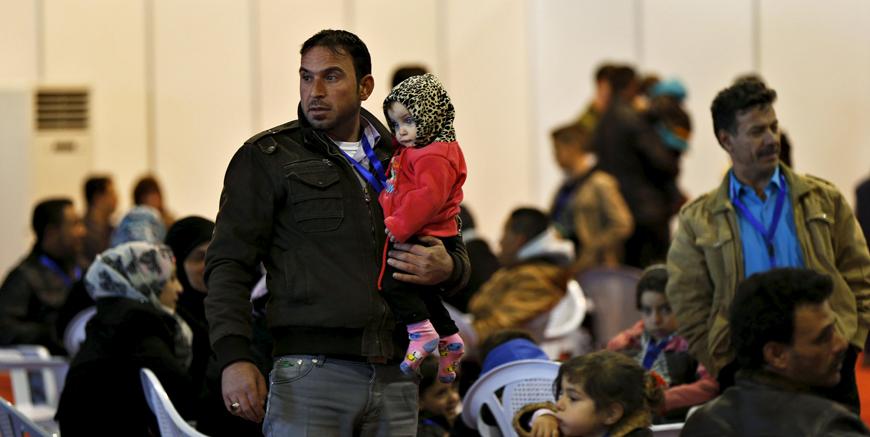You are here
Impact of refugee crisis on family protection discussed at Planning Ministry
By JT - Sep 14,2015 - Last updated at Sep 14,2015

Planning and International Cooperation Minister Imad Fakhoury chairs a meeting with representatives of international donors to review the role and plans of the National Council for Family Affairs (Photo courtesy of Planning Ministry)
AMMAN — Planning and International Cooperation Minister Imad Fakhoury on Monday met with representatives of international donors to review the role of the National Council for Family Affairs (NCFA) and discuss its future plans, according to a ministry statement.
During the meeting, attended by NCFA Secretary General Fadel Hmoud, Fakhoury highlighted the council as an independent institution that works on protecting families, especially in light of the repercussions Jordan is witnessing as a result of the Syrian refugee crisis, which led to increasing social needs.
The influx of refugees, Fakhoury noted, has led to social setbacks that the Kingdom has always worked to improve in order to achieve a respectful life for Jordanians in accordance with international standards.
The planning minister also highlighted the Kingdom’s role in hosting a “huge” number of refugees which therefore requires supporting Jordan’s efforts to limit the effects of the crisis and contribute to the security of Europe and lessen the burden on it as well.
He said not supporting the Kingdom’s efforts will lead to spreading the effects of the crisis outside the region, which in turn will increase financial and social costs.
Moreover, he noted that this can be avoided by providing necessary support for local institutions and hosting communities, and considering Jordan as the first line of defence not only for the Middle East but for the whole world.
Fakhoury underlined the illegal immigration waves witnessed by Europe and said that Jordan receives in only one or two days what certain countries receive in a year.
Jordan appreciates the support it has received, Fakhoury said, noting it is clear that the Kingdom needs continuous support to cope with the increasing demands on services, especially in hosting communities.
The 2015 Jordan Response Plan includes a whole chapter on social protection to enable vulnerable segments affected by the crisis to receive services that sustain levels of safety, particularly in the governorates most affected by the crisis, according to Fakhoury.
Moreover, he said $388.6 million was estimated as what the social sector needs and only $44 million has been secured, which shows even more the importance of increasing efforts from the international community to shoulder its responsibility towards refugees and hosting communities.
To this end, Fakhoury urged the international community to perform its role through development aid and programmes concerned with social care and protection as part of enhancing Jordan’s role.
Hmoud thanked the Planning Ministry for hosting the meeting and offered a presentation on NCFA’s goals and process of work.
Representatives of international organisations and donor countries commended the council’s achievements and voiced readiness to support it, agreeing that there will be meetings between them and members of the council to find a way to implement its visions and goals, the statement said.
Established in 2001 and headed by Her Majesty Queen Rania, NCFA is a civil society umbrella organisation that supports, coordinates and facilitates the work of its partners and relevant institutions that are involved and influential in the field of family affairs.
It acts as a national policy think tank, a coordinating and monitoring body and an advocacy group for family issues.
Related Articles
AMMAN — MPs and representatives of relevant institutions attended a workshop to garner support for a draft law of protection against domesti
The National Council for Family Affairs (NCFA) will soon publish the first national study on the situation of Jordanian families, its secretary general Fadel Hmoud said Sunday.
Representatives of regional countries convened on Wednesday in Amman in a bid to identify the best field-tested survivor-centred practices that must be applied for efficient refugee protection systems












